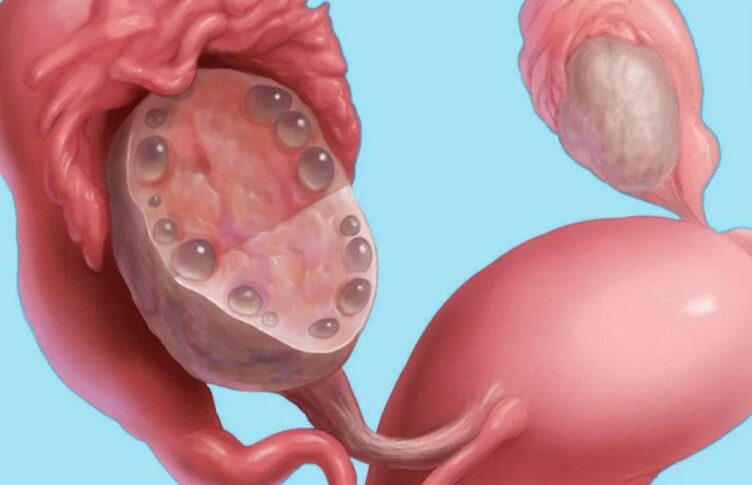Routine Gynecological
Endocrine Disorders – PCOS

Dr. Kriti Agarwal is a renowned PCOS specialist based in Kolkata. With 11 years of experience and a compassionate approach to patient care, she has helped countless women overcome the challenges of PCOS and achieve their dream of starting a family. Dr. Agarwal is known for her expertise in diagnosing and treating PCOS, a common hormonal disorder that affects many women. Her approach involves a personalized treatment plan that addresses the unique needs of each patient, with a focus on holistic, non-invasive solutions whenever possible. Whether you’re struggling with infertility, irregular periods, or other symptoms of PCOS, Dr. Agarwal is here to provide the support and guidance you need to regain control of your health and achieve your goals.
PCOS, or Polycystic Ovarian Syndrome, is a hormonal disorder that affects women. It is characterized by the presence of small sacs filled with fluid (follicles) that grow on the ovaries, leading to the ovaries producing higher levels of androgens (male hormones) and lower levels of estrogen and progesterone (hormones that regulate the menstrual cycle). This imbalance can disrupt the ovulation process and lead to irregular or skipped periods. The immature eggs inside the follicles never fully develop and are not released, which can also affect fertility. These hormonal imbalances can cause other symptoms as well, such as acne, weight gain, and excessive hair growth. Treatment for PCOS often involves a combination of medication and lifestyle changes to manage symptoms and improve fertility.
The exact cause of PCOS is not fully understood, but it is believed to be a combination of genetic and environmental factors. Some potential factors that may contribute to the development of PCOS include:
- Insulin resistance: This is when the body’s cells become resistant to insulin, leading to higher levels of insulin in the bloodstream. This can cause the ovaries to produce more androgens, which can lead to PCOS symptoms.
- Hormonal imbalances: Women with PCOS have higher levels of androgens (male hormones) and lower levels of estrogen and progesterone (female hormones). This imbalance can disrupt the ovulation process and lead to irregular periods.
- Inflammation: Chronic inflammation in the body can also contribute to the development of PCOS.
- Genetics: PCOS tends to run in families, so there may be a genetic component to its development.
- Lifestyle factors: Poor diet, lack of exercise, and stress can all contribute to the development of PCOS.
The symptoms of PCOS can vary from person to person, but common symptoms include:
- Irregular periods: This is the most common symptom of PCOS. Women with PCOS may have fewer than 8 periods in a year or have very heavy, irregular periods.
- Excess androgen levels: Women with PCOS may have higher levels of androgens (male hormones), which can cause excess hair growth on the face, chest, back, and buttocks.
- Polycystic ovaries: Women with PCOS may have enlarged ovaries with small cysts on the outer edge.
- Acne: High levels of androgens can also cause acne on the face, chest, and upper back.
- Weight gain: Many women with PCOS struggle with weight gain and may find it difficult to lose weight.
- Thinning hair: Some women with PCOS may experience hair loss or thinning hair on the scalp.
- Fatigue: Women with PCOS may experience low energy levels or general feelings of fatigue.
- Mood changes: PCOS can also cause mood swings, depression, and anxiety.
PCOS can be diagnosed based on various symptoms such as irregular periods or skipped periods, excess hair growth in the face, chest, back, or buttocks, black velvety skin on the neck or underarms, thinning, breaking, or shedding hair, oily skin, general fatigue or depression, and difficulty in getting pregnant. The diagnosis can be confirmed by a doctor through a clinical examination, blood tests, and ultrasonography to check for the presence of cysts on the ovaries. Treatment for PCOS typically involves a combination of a balanced diet, exercise, and maintaining a healthy weight. Medications can also be prescribed to manage symptoms such as irregular periods, infertility, hirsutism, and obesity. A holistic approach to treatment is important to prevent potential complications of PCOS, such as diabetes, endometrial cancer, and obesity.
Dr. Kriti Agarwal is a highly esteemed gynecologist in Kolkata, renowned for her exceptional expertise in the fields of obstetrics, gynecology, infertility treatment, and laparoscopic surgery. As a skilled consultant, she has earned a reputation as one of the foremost authorities in her field, providing her patients with the highest quality of care and advanced medical treatments.
Menstrual Disorders

Dr. Kriti Agarwal is a highly experienced and skilled gynecologist doctor in Kolkata, specializing in the treatment of menstrual disorders. With her patient-centric approach and compassionate care, Dr. Agarwal provides tailored treatment plans to address a wide range of menstrual disorders, including heavy bleeding, irregular periods, painful periods, and more. She understands the physical and emotional impact that menstrual disorders can have on a woman’s life, and strives to provide comprehensive care that not only alleviates the symptoms but also improves overall health and well-being. She utilizes advanced medical technology and evidence-based treatments, along with lifestyle changes and alternative therapies, to provide the best possible outcomes for her patients. If you’re looking for expert and compassionate menstrual disorders treatment in Kolkata, Dr. Kriti Agarwal is the gynecologist to turn to.
Menstrual disorders refer to any abnormality in the menstrual cycle, which is the regular natural change that occurs in a woman’s body in preparation for pregnancy. Menstrual disorders can include irregular periods, heavy or prolonged bleeding during periods, absence of periods, painful periods, and premenstrual syndrome (PMS) symptoms such as bloating, mood swings, and breast tenderness. These disorders can be caused by various factors such as hormonal imbalances, structural abnormalities in the reproductive system, stress, and certain medical conditions. Proper diagnosis and treatment of menstrual disorders are essential to maintaining overall reproductive health and quality of life.
Menstrual disorders can be caused by various factors such as hormonal imbalances, structural abnormalities in the reproductive system, stress, and certain medical conditions. Hormonal imbalances can result from conditions such as polycystic ovary syndrome (PCOS), thyroid disorders, and diabetes. Structural abnormalities in the reproductive system can include uterine fibroids, endometriosis, and pelvic inflammatory disease (PID). Stress and certain medical conditions such as blood clotting disorders and cancer can also contribute to menstrual disorders. It’s important to consult a healthcare provider to determine the underlying cause of menstrual disorders and develop an appropriate treatment plan.
Symptoms of menstrual disorders can vary depending on the specific type of disorder, but some common symptoms include:
- Heavy or prolonged bleeding during menstruation
- Irregular menstrual cycles or periods that are too frequent or infrequent
- Painful periods or cramping
- Absence of menstruation (amenorrhea)
- Mood changes or irritability
- Fatigue or lack of energy
- Headaches
- Nausea or vomiting
- Changes in appetite or weight
- Abdominal or pelvic pain
Dr. Kriti Agarwal is a highly esteemed gynecologist in Kolkata, renowned for her exceptional expertise in the fields of obstetrics, gynecology, infertility treatment, and laparoscopic surgery. As a skilled consultant, she has earned a reputation as one of the foremost authorities in her field, providing her patients with the highest quality of care and advanced medical treatments.
Treatment For Menopause

I am Dr. Kriti Agarwal, one of the best gynecologists for menopause treatment in Kolkata. With 11 years of experience and a deep understanding of women’s health, I offer personalized care and effective treatment options to help women manage menopause symptoms and maintain their overall health and well-being.
My approach to menopause treatment involves a thorough evaluation of each patient’s unique medical history, symptoms, and lifestyle factors. I work closely with my patients to develop a personalized treatment plan that may include hormone therapy, lifestyle modifications, and other medical interventions.
As a woman ages, her body goes through many changes, including menopause. Menopause is a natural biological process that marks the end of menstruation and fertility. However, for many women, the symptoms associated with menopause can be uncomfortable and disruptive to their daily lives. That’s where I come in as a specialist in the treatment for menopause.
If you are experiencing symptoms related to menopause, such as hot flashes, night sweats, mood changes, and vaginal dryness, don’t hesitate to reach out to me for help. I am committed to providing compassionate care and helping women navigate this important stage of life with confidence and ease. Contact my clinic today to schedule an appointment for the best treatment for menopause in Kolkata.
Menopause is a natural biological process in women that marks the end of their reproductive years. It is defined as the permanent cessation of menstrual periods for at least 12 consecutive months. Menopause typically occurs in women between the ages of 45 and 55, but it can also happen earlier or later. During menopause, a woman’s body undergoes hormonal changes that can cause a variety of physical and emotional symptoms, including hot flashes, night sweats, mood changes, vaginal dryness, and sleep disturbances. While menopause is a normal part of aging, it can also increase the risk of certain health conditions, such as osteoporosis and cardiovascular disease.
Menopause can cause a variety of physical and emotional symptoms. Some common symptoms of menopause include:
- Hot flashes and night sweats: Sudden feelings of warmth, flushing, and sweating, often accompanied by a rapid heartbeat and chills.
- Irregular periods: As menopause approaches, periods may become irregular and eventually stop altogether.
- Vaginal dryness and discomfort: As estrogen levels decline, the vaginal tissues may become thinner, drier, and less elastic, which can cause discomfort and pain during sex.
- Sleep disturbances: Many women experience insomnia, difficulty falling asleep, or waking up frequently during the night.
- Mood changes: Hormonal fluctuations can cause mood swings, irritability, depression, and anxiety.
- Physical changes: Menopause can also cause physical changes such as weight gain, hair loss, dry skin, and joint pain.
- Sexual changes: Menopause can affect a woman’s sex drive, sexual function, and ability to become aroused.
Menopause is a natural biological process that occurs when a woman’s reproductive system gradually stops functioning, leading to the end of menstrual periods. It is caused by a decline in the production of the hormones estrogen and progesterone, which are produced by the ovaries. This decline in hormone production can be attributed to aging, as the ovaries begin to age and produce fewer eggs, leading to a decrease in estrogen production. Other causes of menopause may include surgical removal of the ovaries, chemotherapy, or radiation therapy.
There are several risk factors that can increase a woman’s likelihood of experiencing early or premature menopause. Some of these risk factors include:
- Genetics: Women with a family history of early menopause are at a higher risk.
- Smoking: Smoking cigarettes can cause earlier menopause onset.
- Chemotherapy and radiation therapy: These cancer treatments can damage the ovaries and cause menopause to occur earlier.
- Surgical removal of the ovaries: If both ovaries are removed, menopause will begin immediately regardless of the age.
- Autoimmune diseases: Certain autoimmune diseases such as thyroid disease, lupus, and rheumatoid arthritis can cause early menopause.
- Obesity: Women with a higher body mass index (BMI) may have an increased risk of early menopause.
- Ethnicity: Some ethnic groups such as African American and Hispanic women may experience menopause earlier than women of other ethnic groups.
Perimenopause is the transition period before menopause when the body gradually makes less estrogen. Some common perimenopausal changes include:
- Irregular periods: As the ovaries start to produce less estrogen, menstrual cycles become irregular, either shorter or longer, with heavier or lighter bleeding.
- Hot flashes and night sweats: Hot flashes are sudden, intense feelings of heat and sweating, often followed by chills. They can occur anytime during the day or night, and may last from a few seconds to several minutes.
- Vaginal dryness: As estrogen levels decrease, the vaginal tissues become thinner, drier, and less elastic, which can cause discomfort during sex.
- Mood swings: Hormonal changes during perimenopause can cause mood swings, irritability, depression, and anxiety.
- Sleep disturbances: Night sweats and hot flashes can disrupt sleep, leading to insomnia and fatigue.
- Changes in libido: Lower levels of estrogen can also affect sexual desire and arousal.
- Changes in skin and hair: Perimenopause can cause changes in skin and hair, including dryness, thinning, and loss of elasticity.
Dr. Kriti Agarwal is a highly esteemed gynecologist in Kolkata, renowned for her exceptional expertise in the fields of obstetrics, gynecology, infertility treatment, and laparoscopic surgery. As a skilled consultant, she has earned a reputation as one of the foremost authorities in her field, providing her patients with the highest quality of care and advanced medical treatments.

SCHEDULE A CONSULTATION WITH THE BEST GYNECOLOGIST!
Contact Info.
-
drkritiagarwal.com@gmail.com
-
+91 9330099305

